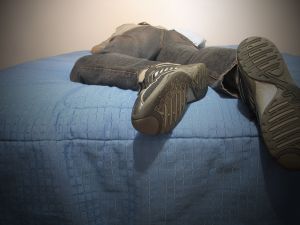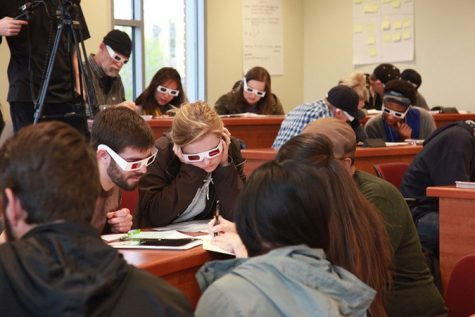College students and sleep deprivation
Sometimes we can only laugh when our parents tell us to “have a good night’s sleep.” “Sleep,” we think, “what’s that? I’m a college student!”

Sleep, though often one of the first things to be sacrificed in one’s daily life, is proven to assist in one’s memory, energy, and emotions.
October 4, 2008
Sometimes we can only laugh when our parents tell us to “have a good night’s sleep.”
“Sleep,” we think, “what’s that? I’m a college student!”
The truth is, this is no laughing matter. Sleep deprivation is a serious issue facing college students. According to web site sleepdeprivation.com, studies show that about 20 percent of college students are victims of sleep deprivation and other related sleeping disorders, such as insomnia. The sleep deprivation web site lists common causes of sleep deprivation and its harmful effects on our bodies, as well as suggestions to combat it. Check out the list below … then go take a nap.
Common reasons for sleep deprivation:
- Hectic schedules: Experts say it’s normal for college
students to experience different sleeping patterns once
they leave home and enter the world of the dorms.
Students often lose sleep as they try to balance busy
schedules filled with classes and work. - Cram sessions: While some students study best when
cramming, this may not benefit your sleeping patterns.
Students may stay up late to cram for exams, but
sometimes they might have a harder time retaining the
information because of their exhausted bodies. - Worries: Some students report sleeping problems
because they are too worried to sleep. Whether a big
exam is coming up or financial deadlines are looming,
many students lose sleep worrying about their futures.
Effects of sleep deprivation:
Students can react to sleep deprivation in a variety of ways, depending on the seriousness of the issue. Common reactions studied by experts are:
- Short term effects: Students who deprive themselves of
sleep are hurting their bodies, causing a heightened
level of exhaustion and irritability. Many students will
find that they cannot perform to the best of their
ability when they lose sleep. Side note: sleep
deprivation is another factor that can lead to weight
gain and the “freshmen 15” – many students who suffer
from sleep deprivation increase their food intake. - Long term effects: Sleep deprivation can lead to more
serious effects than grogginess. Heart attacks, strokes
and seizures are some of the other possible consequences
of sleep deprivation.
Solutions to sleep deprivation:
While it might be challenging to get enough sleep – after all, you are busy – here are some tips for incorporating a good night’s sleep into your schedule.
- Exercise: Exercising is not just to ensure that you
don’t gain weight; it is a key element to getting a good
night’s rest. Doctors and sleep specialists state that
exercise can help students establish healthy patterns
that will make sleeping easier at the end of a long day.
On a side note, it is not healthy to exercise right
before going to sleep. Exercise will stimulate your body
and make it harder to sleep immediately afterward;
doctors recommend that you exercise at least three hours
before sleeping. - Planning naps: Naps can be good ways to catch up on
sleep, but only when planned and “used” properly.
Experts state that you should take naps in the early
afternoon and for no longer than 20 to 30 minutes.
Longer naps toward the end of the day might disrupt your
sleeping schedule. - Schedule in sleep: Experts recommend setting aside a
few days a week to get a full night’s sleep. The
majority of people need six to eight hours of sleep to
function properly. While it is recommended that students
go to bed and wake up around the same time every night,
busy schedules make this routine nearly impossible. To
combat this, experts suggest trying to get additional
hours of sleep several times of week, in order to
prevent long-term health issues.
You can find more information about sleep deprivation at www.sleep-deprivation.com.






